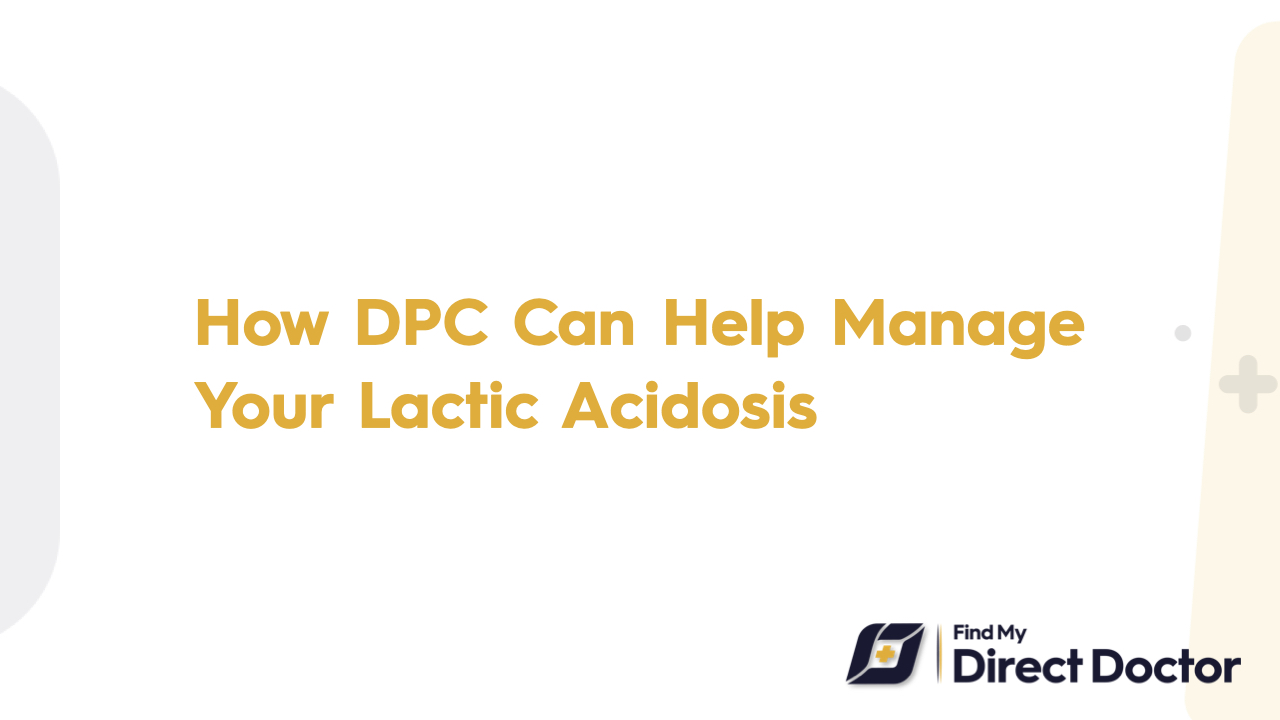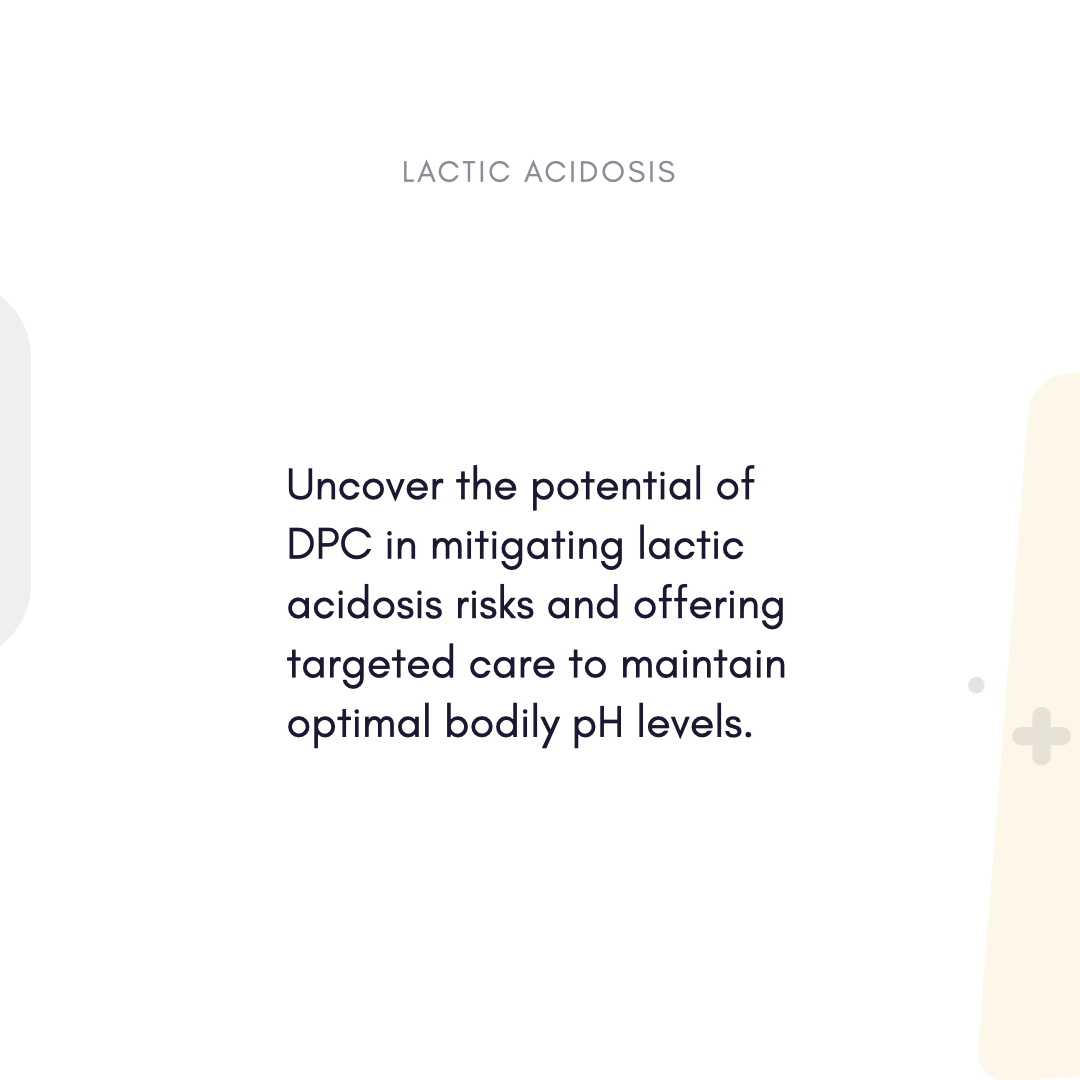Lactic Acidosis and Direct Primary Care (DPC): Proactive, Personalized Metabolic Care
If you have ever experienced sudden muscle weakness, rapid breathing, or unexplained nausea, you might be among the thousands of people suffering from lactic acidosis—a severe metabolic imbalance where lactate accumulates in the bloodstream. Usually related to sepsis, diabetes, or drug side effects, untreated lactic acidosis can lead to organ failure or death. Offering a simplified, patient-first approach to treat this condition with fast diagnosis, tailored care, and continuous monitoring—free of insurance barriers—Direct Primary Care (DPC) provides a lifeline.

Seeing Lactic Acidosis
Lactic acidosis results from either excessive lactate production by the body or ineffective clearance:
- Hypoxia: Low oxygen levels from sepsis, heart failure, or severe asthma.
- Medications: Diabetes drugs like metformin or HIV NRTIs.
- Chronic conditions: Liver disease, alcoholism, or mitochondrial defects.
Symptoms needing quick attention:
- Rapid, shallow breathing.
- Muscle weakness or cramps.
- Stomach pain, vomiting, or nausea.
- Confusion or letharg.
Long-term risks of unmanaged lactic acidosis:
- Organ damage: Kidney, liver, heart.
- Shock or multi-organ failure.
DPC Transforms Lactic Acidosis Control
Under the membership model known as Direct Primary Care (DPC), patients pay a monthly fee—usually USD 50–USD 150—for unlimited access to their doctor. For those with lactic acidosis, this means no delays in critical care, no surprise bills, and treatment targeting root causes—not just symptoms.
1. Individualized, Preventive Maintenance
DPC providers follow American College of Physicians (ACP) guidelines to:
- Early diagnosis and rapid response:
- Same-day lab testing: Blood lactate levels, electrolytes, kidney/liver function at wholesale rates (USD 10–USD 30).
- Immediate treatment for severe cases: IV fluids, oxygen therapy, or bicarbonate infusions.
- Medication review: Identifying and adjusting drugs (e.g., metformin) causing lactate buildup.
2. Customized, Preventive Strategies
DPC reduces recurrence risk by:
- Chronic disease management: Strict control of diabetes, heart failure, or liver disease.
- Lifestyle coaching: Hydration techniques, alcohol moderation, or exercise plans to avoid overexertion.
- Metabolic monitoring: Regular lactate and pH tests for high-risk patients on metformin or other triggers.
3. Seamless Specialist Coordination
DPC ensures:
- Direct hospital admission during emergencies: Critical care referrals without ER delays.
- Collaboration with endocrinologists and nephrologists: Managing diabetes or kidney disease.
- Genetic testing: Discounted panels for mitochondrial conditions.
Key DPC Benefits for Lactic Acidosis Patients
- 24/7 access: Same-day labs and treatments to prevent shock.
- Cost transparency: Avoid USD 500+ ER bills for treatable issues.
- Root-cause focus: Addressing sepsis, drug toxicity, or liver dysfunction directly.
DPC’s Customized Lactic Acidosis Management
DPC tailors care to your unique needs:
- Managing Short-Term Episodes:
- Mild to moderate IV hydration and oxygenation to stabilize pH in-clinic.
- Drug adjustments: Switching from metformin to safer alternatives like SGLT2 inhibitors.
- Emergency coordination: Direct hospital transfers for lactate > 5 mmol/L or severe acidosis.
- Long-Term Oversight:
- Chronic disease strategies: Optimizing diabetes, heart, or liver care to reduce triggers.
- Dietary guidance: Low-carb diets for alcoholism, mitochondrial disorders, or thiamine deficiency.
- Quarterly lactate tests as part of routine monitoring for high-risk patients on medications like metformin.
- Specialist Collaboration:
- ICU follow-up: Post-hospital care to prevent relapse.
- Genetic counseling for inherited metabolic disorders.
Real-Life Success Stories
- Case 1: Maria, 58, developed lactic acidosis after dehydration while on metformin. Her DPC doctor ran same-day labs, discontinued metformin, and administered IV fluids—avoiding a USD 2,000 ER visit.
- Case 2: James, 45, had chronic liver disease and recurring lactate spikes. His DPC doctor, working with a hepatologist, adjusted meds and added thiamine. His levels stabilized in three weeks.
Frequently Asked Questions: DPC and Lactic Acidosis
- Q: Is lactic acidosis fatal?
A: True—severe cases demand rapid intervention. DPC’s 24/7 access lowers hospitalization risk.
- Q: For ongoing monitoring, is DPC reasonably priced?
A: Indeed! Members save on regular labs and specialist co-pays—often under USD 100/month.
- Q: If I need an ICU, what then?
A: DPC doctors coordinate direct hospital admissions for smooth care transitions.
Why DPC Wins for Lactic Acidosis Patients
DPC’s model removes insurance barriers to:
- Early detection: Regular testing catches rising lactate before organ damage occurs.
- Targeted treatments: Tailoring care to root causes like drug toxicity, sepsis, or heart failure.
- Holistic care: Integrating specialist input, chronic disease management, and nutrition.
Studies show DPC’s continuity and customized care improve outcomes for metabolic disorders.
Regain Metabolic Balance with DPC Right Now
Lactic acidosis need not become a crisis. DPC provides a partner who delivers transparent pricing, personalized preventive care, and urgent treatment free of insurance hurdles.
- From same-day labs to chronic disease coordination, DPC enables metabolic stability.
- Financial clarity—no hidden fees or surprise specialist charges.
- 24/7 access to modify treatment during sudden lactate spikes.






